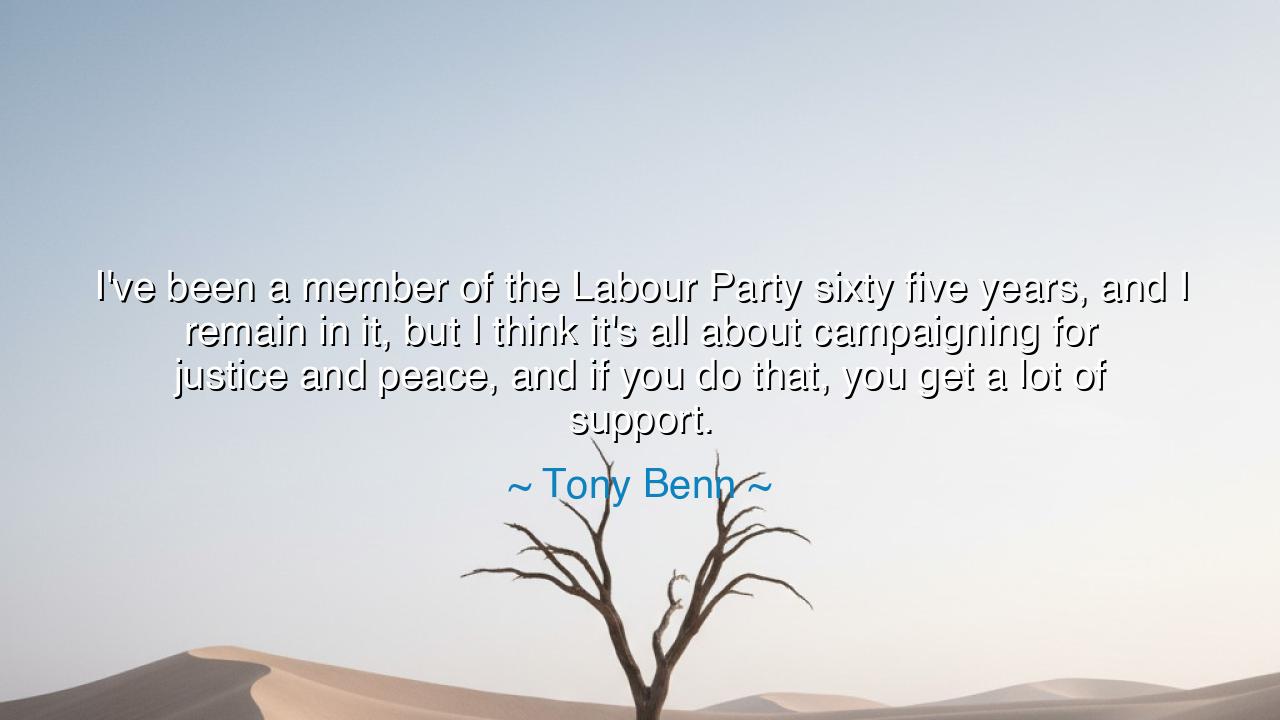
I've been a member of the Labour Party sixty five years, and I
I've been a member of the Labour Party sixty five years, and I remain in it, but I think it's all about campaigning for justice and peace, and if you do that, you get a lot of support.






The words of Tony Benn—“I’ve been a member of the Labour Party sixty-five years, and I remain in it, but I think it’s all about campaigning for justice and peace, and if you do that, you get a lot of support”—are the voice of a man who walked faithfully in the arena of politics yet spoke always as a servant of conscience. In this declaration, Benn proclaims that the measure of a political life is not in titles held nor in the longevity of membership, but in the steadfast pursuit of eternal virtues: justice for the oppressed, peace among peoples, and the strength to keep fighting for these ideals even when the winds of power blow cold. His words are not merely about a party, but about a vision of politics as moral duty.
The origin of this statement lies in Benn’s own long career as a British parliamentarian and one of the most enduring figures of democratic socialism in the twentieth century. A man of principle, he saw politics not as a game of self-interest, but as a sacred calling to improve the lot of ordinary men and women. He was loyal to the Labour Party, but his loyalty was not blind—it was always conditioned by its commitment to justice and peace. In his view, if a party forgot those things, it forgot its very soul. Thus, his words carry both devotion and challenge: devotion to the cause he had served for decades, and challenge to all who would lead without vision.
History confirms the truth Benn so passionately proclaimed. Consider the life of William Wilberforce, who fought for the abolition of slavery in Britain. He too remained within his party, endured opposition, and bore the mockery of those who said his crusade was hopeless. Yet because he campaigned for justice, he gained the support of multitudes, and at last, the evil of slavery was struck down. Likewise, Benn reminds us that when the cause is righteous—whether in abolishing chains, securing peace, or defending the powerless—support will gather, not always quickly, but surely, for the human spirit is drawn to righteousness.
The meaning of Benn’s words is therefore both political and spiritual. He declares that people respond not to hollow slogans, but to causes rooted in moral truth. A party may survive on strategy and division, but it will never inspire unless it fights for justice. A movement may shout for power, but it will never win lasting loyalty unless it stands for peace. It is these virtues, older than any party, higher than any government, that stir the hearts of ordinary people and gather them into great tides of change.
The ancients too understood this truth. The prophet Isaiah thundered, “Learn to do right; seek justice. Defend the oppressed.” The Roman historian Tacitus lamented leaders who called their conquests peace, while in reality they left only devastation. And Christ himself proclaimed, “Blessed are the peacemakers.” Across all ages, the verdict has been the same: those who seek justice and peace walk in the way of eternal honor; those who forsake them sow ruin. Benn’s words are an echo of this long tradition, spoken through the lens of his life’s work.
The lesson is clear: let no one in politics—or in life—forget that true power lies not in control, but in service. Campaign for justice, even when it is costly. Strive for peace, even when the world is loud with war. And know that in doing so, you will win support—not merely the votes of the day, but the deeper support of history, of conscience, and of truth. For causes rooted in righteousness endure, while ambitions rooted in selfishness wither like grass.
Practically, let each of us carry this teaching into our own lives. In your workplace, in your community, in your nation—fight for fairness, defend the voiceless, and be a peacemaker. Support leaders not for their charm or promises, but for their commitment to justice and peace. And when you grow weary, remember the example of Benn, who after sixty-five years still held firm to his cause. His life teaches us that perseverance in righteousness is never wasted, for it leaves behind a legacy that strengthens those who follow.
Thus, Tony Benn’s words endure: “It’s all about campaigning for justice and peace, and if you do that, you get a lot of support.” Let them be remembered not only as the reflection of one man’s political journey, but as a timeless principle for every generation. For parties and governments rise and fall, but the call to justice, the call to peace, and the call to faithfulness remain eternal.






AAdministratorAdministrator
Welcome, honored guests. Please leave a comment, we will respond soon